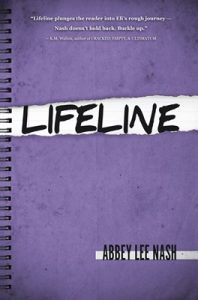Fiction. 294 pgs. Tony Fox Press. May 2018. ISBN: 978-1-946501-06-6.
“You can do anything for 28 days.”
These are the words that Eli Ross hears from his mother just before being admitted to LakeShore Recovery Center in the beginning of Abbey Lee Nash’s debut novel, Lifeline. When the novel starts, readers are automatically thrust into the fast-paced life of the main character, Eli – right smack in the middle of a lacrosse game, to be exact. The first person narrative of Eli is meant to draw readers in and make them feel like they are right there beside our young male protagonist as he’s winning this lacrosse game that has gone into “sudden death” – an interesting choice of words on Nash’s part considering what happens within a matter of hours after the opening scene. The first chapter is titled “Before,” which signals to the reader that some significant event is most likely going to happen. Right away, the reader is left wondering “Before what?” and have to resist the urge to flip forward into the novel to see what happens. Aside from the lacrosse game, Nash also includes a snippet of Eli at home, introducing the reader to his family and, more importantly, his secret stash of heroin tucked into a sock in his drawer. The inclusion of the scene where Eli struggles with whether or not he should use the last of his stash is important to the concept of “before” – it gives the reader a hint to what might be the event that will come later.
After this, the novel starts to signify chapters with timestamps as the reader follows Eli through the rest of his night as he goes to the party at Alex’s house, restocks his stash from his friend Chase, interacts with his friends and girlfriend, until finally he indulges in his stash once again: “My body melts like crayons in the sun, colors merging in a puddle of rainbow wax. And I…can’t…feel…anything.” It is after this second instance of Eli doing drugs in one night that Nash includes two pages of simply timestamps – 3:00 AM and 4:00 AM – signifying that our narrator, Eli, is not conscious and we are left to wonder what happened until he regains consciousness at 5:00 AM and again at 9:00 AM. In the latter chapter, Nash provides more insight into what happened, why those few hours were lost to Eli and to the reader – he’d overdosed and was taken to the hospital, which is where he finds himself now: “I’m sweating now, and my heart is racing for real, because all at once the pieces are coming back to me. The game. The party at Alex’s. Savannah leaving me on the deck. Getting into my car. The pills. The sirens…” Finally, Nash provides us with the coveted “After” chapter, which follows Eli as he’s discharged from the hospital and is taken to LakeShore Recovery Center by his mother and step-father. It’s in this short chapter that we hear the words Eli’s mom tells him: “You can do anything for 28 days,” which Eli repeats to himself before following his mom into the building. After this, the chapters of the novel are broken up in the 28 days that Eli is meant to spend at LakeShore, giving the readers a perfect linear timeline to follow for the rest of the novel.
In the “After” chapter, Eli’s mom tells him that he can do anything for 28 days, which is something that he repeats to himself in his first person narrative, as I mentioned above. However, this is not the only time that this type of repetition occurs in the novel. In fact, it seems that Nash has included the repetition of different words and phrases throughout the entirety of the storyline, whether it be mantras that Eli repeats to himself or the reiteration of the steps that he must take on his road to recovery. The very first instance of this repetition of mantras in Eli’s narrative is in the first chapter, when he’s trying to decide whether or not he should get high. He tells himself, “I can save it. I can wait,” even though we come to find out that he can’t obtain the will power that he tries to instill in himself by repeating the words in his mind.
As novel continues and the longer that Eli stays at LakeShore, the repetition seems to slowly transform into something more positive. Instead of trying to convince himself that he isn’t an addict, that he doesn’t have a drug problem, he’s reminding himself of the things that he hears while in recovery – things from his Step One packet, phrases said to him by his counselor, Richard Fisher, or any of the other people he’s met at LakeShore. It seems like Nash includes this repetition of phrases throughout the book in moments when Eli feels vulnerable. For example, during his fourth day in recovery, Eli has his first meeting with Richard Fisher. After his counselor provides him with a harsh reality about struggling with addiction, Eli, in a moment of vulnerability, is reminded of his ex-girlfriend, Savannah, in his hospital room after his overdose, saying: “You need help, Eli.” Even in Eli’s most vulnerable moments where his sobriety is threatened, either by watching his friend Will score at a Narcotics Anonymous meeting or being handed a bag of pills by his friend Chase during visiting hours at LakeShore, he returns to the past. When he’s tempted to ask Will to share his drugs, he relies on his friend Red and telling stories about each other’s lives to get him through the night. When he’s tempted to take the bag of pills from Chase, he’s reminded of the night he spent with Red after watching Will score: “Whatever you do, Red had begged me the night Will left, don’t let me leave this room.” Even at the end of the novel, as Eli leaves LakeShore and his 28 days spent there behind him, he reminds himself: “One foot in front of the other.” And we can expect him to repeat that mantra as often as possible as he continues his journey into sobriety.
Nash’s novel is about more than just one kid’s journey to sobriety and the obstacles he has to overcome to get there. It’s about the importance of not being afraid to talk about one’s feelings, struggles, or pain. Eli’s road to recovery is full of revisiting painful memories – his parents’ divorce, his dad’s death, Winter Formal – and making sense of them through reflection. He learns that he can’t run from the past, he can only learn from it. This is exactly what Eli does during his 28 day stay at LakeShore through the constant reiteration of words and phrases from his Step Packets, Richard Fisher, and his friends. As Eli learns throughout the novel, recovery is difficult and messy, but it’s not something that has to be endured alone, an idea reinforced by Richard Fisher and by Eli himself in the last chapter of the novel: “Let us believe in you until you can believe in yourself.” If Eli can endure those tumultuous 28 days at LakeShore, recovering from his addiction and coming face-to-face with the trauma he’s suppressed throughout his life, then it’s possible to endure the next 28 days after that, and the next 28 days after that, and so on.
Lifeline is available through Tiny Fox Press. Purchase it now through their website.
ASHLEY SELL is currently a student at Bridgewater College in Bridgewater, Virginia, set to graduate in May of 2021. She is studying to obtain a Bachelors in English. She plans to pursue a Masters in Education after graduating from Bridgewater to become an English teacher. In her spare time, she enjoys cuddling with her two dogs and getting lost in a good book (or Netflix show). She was born and raised in Hampton, Virginia.
Like what you’re reading?
Get new stories or poetry sent to your inbox. Drop your email below to start >>>
OR grab a print issue
Stories, poems and essays in a beautifully designed magazine you can hold in your hands.
GO TO ISSUESNEW book release
I’ll Tell You a Love Story by Couri Johnson. Order the book of which Tim Jeffries said, “Surprising in their originality, filled with broken wisdom, and with a refreshing use of language and imagery, these are stories to savour and mull over one at a time but which add up to a satisfying whole.”
GET THE BOOK


